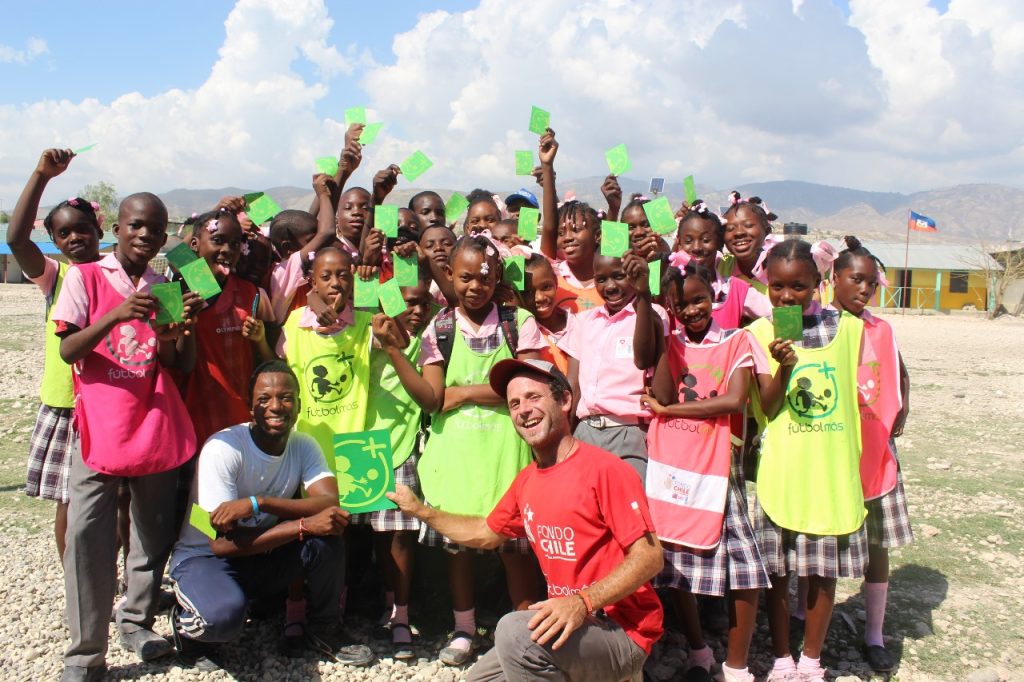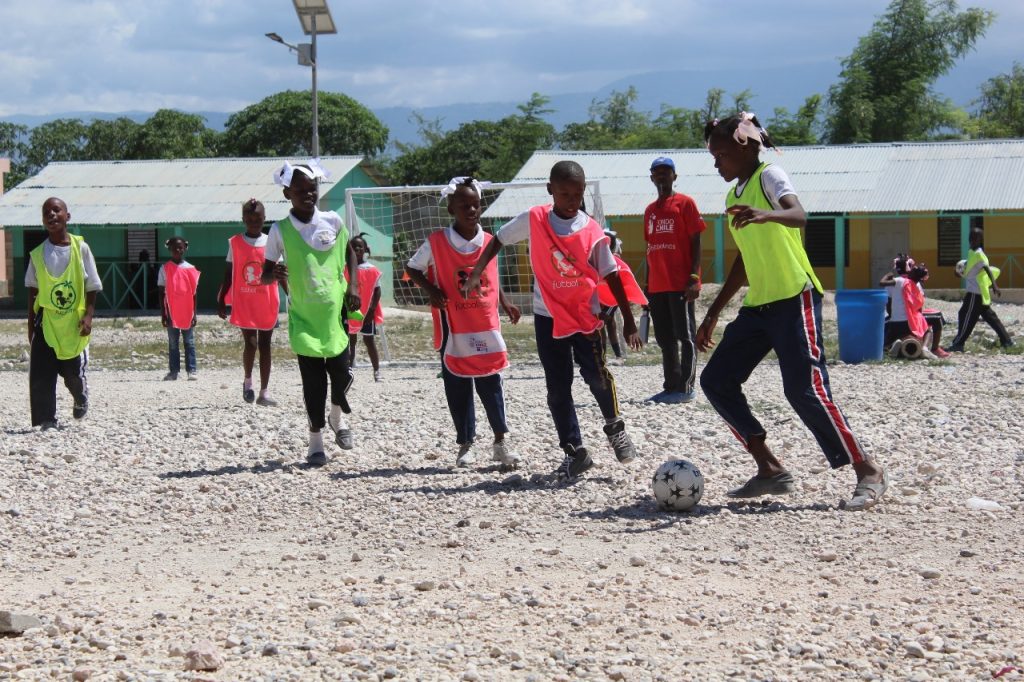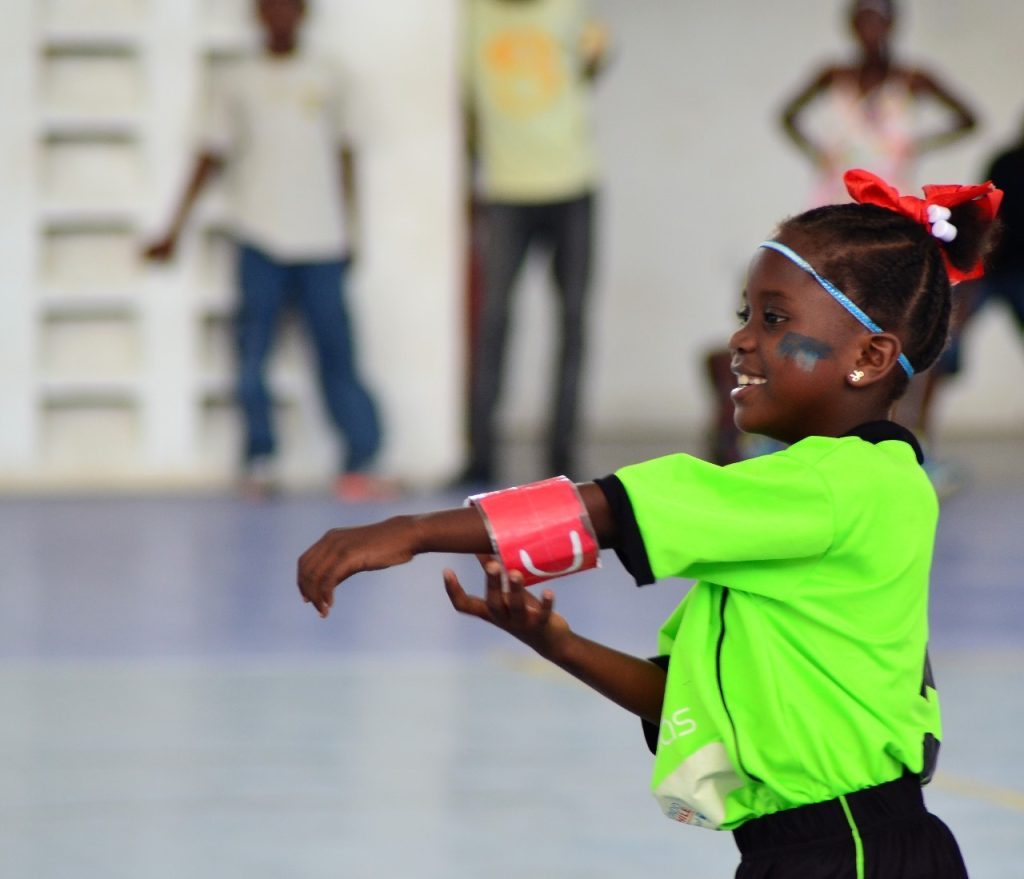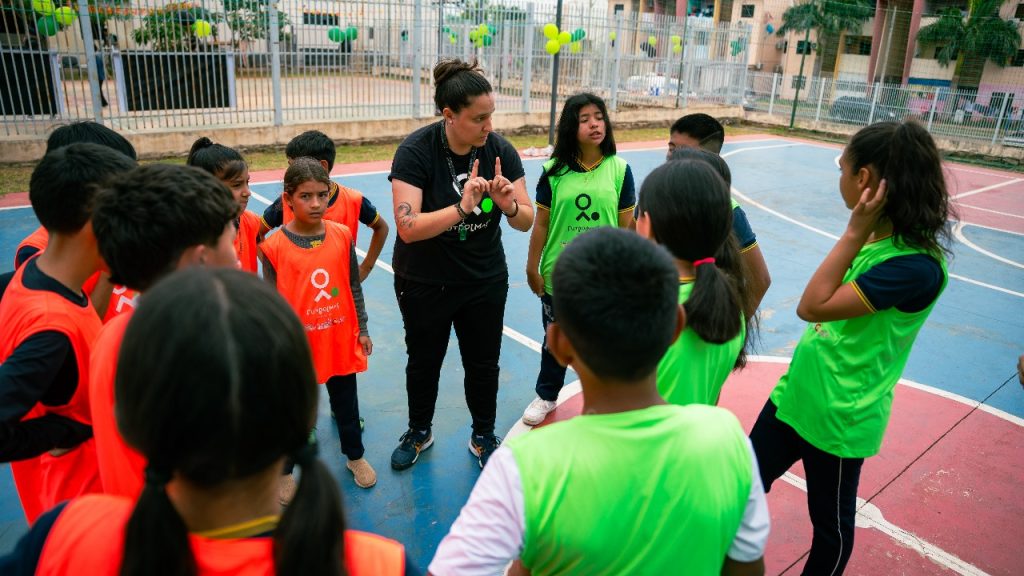NEWS
17 years ago, in the south of the world, they forged an idea: take up the sport and play to promote safe spaces for children. What began in three communities of Santiago of Chile, to the day of today is a global program that has had a presence in 11 countries of the world in a direct way. Originally, the intention was to develop an intervention where a professional in the area of social and other physical education to promote life skills in children, at the same time to develop resilience. All this whilst playing on the pitch of your neighborhood. Removed the red card and yellow, and there were the Green Card and the Blue Card. First, you reward the positive behaviors of children during training sessions, while the blue, invites to improve or reflect on certain attitudes that can be improved. Quickly, this methodology was growing and adapting. What was originally thought to neighborhoods, is adapted to work in contexts of natural disasters, then developed with a population that is in a situation of mobility, then went on to residences and it is now possible to transfer it to a professional in the world to increase exponentially as the impact of this methodology that focuses on proactive initiatives. That evolution had a point summit 10 years ago in Haiti, where he was born the Schools "program".
The Schools "program" was not a program conceived in the strict sense of the term. The reality was that imposed its logic, and forced to Futbol Mas to adapt the methodology that has been applied in "Neighborhoods". Coincided with the stage of internationalization. The Foundation was already installed in Ecuador when the possibility arose to work in Haiti. It was a few years after the earthquake that struck the island in 2010 and left 316 thousand dead and one and a half million homes were destroyed. A team of Futbol Mas came to the island in 2014 to work in the settlement of Canaan, an area which was occupied after the earthquake, and that for that year brought together 400 thousand inhabitants. The intention was to dump there the program "Neighborhoods," which had premiered in Chile and had been executed, with some adjustments, in Ecuador. However, that was more difficult in Haiti. Not so much for the damage caused by the earthquake, but because in the logic of organizational of the country was more prudent to work from the schools and in the communities.


The reality required flexibility. Then came the schools as the place around which the boys and girls were agglutinated, and also appeared in the policies of proxies and empowerment, and the professors and the teachers. Suddenly, in an almost organic way, the adaptation of the program "Neighborhoods" had morphed into "Schools". And almost in the same way, the new program went into the schools of Canaan, and won a space in the school schedule. Without that there would be a planning a rigid and pre-established, "Schools" was finding its way in a natural way. They began to form bridges between the schools, and the Green Card became an instrument occupied by teachers, and validated by the boys and girls.
The experience with the teaching staff in Haiti was very special. In the beginning, it was not easy because the team of Futbol Mas arrived to change the way of doing things and, in fact, that was not the idea. Quickly, in the middle of a country with a cultural reality that is very different to the rest of Latin America, there was that to consider a different way of interacting with the faculty. Had to give them tools and help them to handle stress. Thus was born the "Place of Education".
"Place of Education" in an instance in which the objective is the body of male and female teachers. It is a space in which to leave aside their role as educators, to afford the game, to retrieve the part of the child or the child that you were. It is a flagship initiative of the Schools "program" and one of the most valued and well received by the faculty. Somehow, the Foundation contributes to the educational project, ensuring the mental health of the teachers.

The story of the "lady Chapel of Education" is very related to the pandemic and the need to work with the mental health of the teachers and assistants. The load was high and the stress triggered by the context of a public health emergency, stressed a lot of the climate between male and female teachers. The "locker Room Education" was dedicated to work from the significant link, the team work and the recognition and expression of emotions in order to address this difficult time. Today, it is one of the lines of action star of "Schools", thanks to the positive feedback we deliver and teachers.
It is necessary to say that this initiative is not the only way of relationship with the teachers and professors. There is a line of training in running a methodological transfer so that they can implement strategies and tools of Futbol Mas in the classroom. There is also a training to perform activities outside of the classroom, in which the monitors of the Foundation carried out an accompaniment. There were even times in which we worked in groups or individually with some of them. In each of these cases, the objective was addressed to boys and girls.
In all countries in which it has been implemented in the Schools "program", one of the great legacies has been the incorporation of the gaming experience as a complement to the learning, and not just for the physical education class. The methodology of Futbol Mas has shown that the game can be a great ally for both classes of history, math, chemistry, strictly to the teaching of any subject.
In Canaan (Haiti), not only joined the gaming experience, it also created schools, in such a way that each school was left with 70 table games, and the team of Futbol Mas was held to train teachers to channel the raw materials of various subjects through these games.
In this sense, the methodology of Futbol Mas incorporated into the teaching has enabled us to expand the range of possibilities of the faculty with respect to innovate in the classroom, offering to channel the learning from the logic of boys and girls or, at least, from an approach that protects their rights, especially the right to play and, from there, to manage the teaching from a status much more motivating.
On the other hand, the participation of the children in the program Futbol Mas has allowed us to obtain more information on each one of the students from a different relationship, which has provided the possibility to teachers and specialists of the schools to perform work much more personalized with each one of the students, in order to generate changes and transformations in their path of learning and development.
The tour of the Schools "program" has only been possible with the support of different public and private stakeholders who have allowed their development. In all countries, the program works much from the co-teaching and conforms to the guidelines of the Ministries of Education and their curriculum, including the sport for the development of the educational project from the Physical Education.
One of the experiences most recent success of the Schools "program" was developed in Chile, where up to 2024, was developed in eleven establishments of the Region of O'higgins. There he fulfilled his third year of continuous service under the name of "Educating through the Game and the Sport." Beyond deepening raises the methodology of Futbol Mas carried to the classroom, the intent is to continue to build schools in the medium term so as to generate an even greater impact. At the same time, one of the areas where they are heading the efforts to the strengthening of the school league between establishments.

"Educating through the Game and the Sport," was accepted unanimously among the teachers, not only from what happens on the pitch. For example, in the art class is working on the design of elements that can be used by the bars of students that encourage their team during encounters with other schools.
The entirety of the program, which includes not only teachers, but the entire school community, is something that the actors stand out in all the countries where it takes place.
"School" is a program that has the main purpose to promote the welfare, the good treatment and the healthy school life of children and young people through the development of life skills through activities sociodeportivas in their school communities.
Depending on the context, you can engage with the surrounding community to the educational establishment. This means, that, if the infrastructure is not enough, the sessions can be conducted in a space adjacent to the school, where in addition to involving the boys and girls of the neighborhood that does not necessarily attending that school. Another possible scenario is that the program is fully developed inside of the school, but by inviting the children of the neighborhood to participate, but inside the place. Finally, it can be done only and exclusively within the school and to the community in specific.
Attending to the particularities mentioned above, it usually develops within the educational institutions and it is aimed, primarily, to the students. However, in that spirit, it is also working with the other members of the school community: faculty, staff, parents and the empowerment, and the auxiliary, in general all those who qualify in the concept of adult/a significant/a for children and young people.
In addition to ensuring the welfare, the good treatment and the healthy co-existence, "School" is concerned with the sustainability of the care, social-emotional, through the facilitation of tools to leaders and leaders of the school community. In this sense, there is an interpersonal relationship with the beneficiaries, much more directly, which further validates the image and the role of the teacher.
Within the "Schools" there are certain decisions that are taken in conjunction with the authorities of the colleges, and aim to whether the activities are performed within the hours JEC (Full School Day) or are part of the variety of extracurricular activities; the same if it is channeled through the physical education class, or are made from another pathway, such as sports workshops. Even, in certain interventions, considering that schools are sometimes perceived as entities rather closed, it has been sought to open the program linked with the communities that surround it. This usually happens when the program is run on a schedule extraprogramático, in such cases, the call is much more extensive that if the program is to develop within hours JEC.
The experience and evolution in the Schools "program" in Haiti and Chile, had a special chapter, through a project that Futbol Mas made in Venezuela. With the support of the Ministry of Education of that country it was possible to generate a space of methodological Transfer in 178 schools in 14 different states, where the goal was to train teachers to address the back-to-school activities the post Covid-19 with an emphasis on the strengthening of the physical activity, play and learning social emotional. In total, and thanks to technology, Football was able to reach nearly 13 thousand beneficiaries indirectly
In the year 2024, the 15.026 children and young people benefit from Futbol Mas at the global level, 7.382 participated in the Schools Program, developed in 52 facilities located in 6 countries on 3 continents
In 2024, the Schools "program" began in Mexico, a country where the foundation is working since the year 2017. The interventions were developed in two states: State of Mexico and Baja California Sur, in the communities of Zinacantepec, and Cabo San Lucas, respectively. In the case of Cabo San Lucas, the project was developed thanks to the Foundation Coppel and consisted of an 18-month program that began in January 2024 at the Institute of the Sea and the Secondary School N°35, where he worked with the first, second, and third grade of secondary school.
Besides, featured with action lines such as Co-Teaching, the Chapel of Education and the Liga Inter-Schools with the goal of generating a climate of healthy coexistence between the two communities in education.
On the other hand, the intervention in Metepec was held with the support of the Foundation's Ten Morodo, where the program is developed in high school #35, with which he worked during a period of 12 months. With direct implementation of sessions sociodeportiva extra-curricular, collaborative spaces with the area of physical education and training, and areas of strengthening with the teachers of the school.
It is worth noting, as one of the main lines of action of the ‘Schools’, the importance of the Shrine of Education, where the main objective is to work with the faculty. It is a space in which to leave aside their role as educators, to afford the game, to retrieve the part of the child or the child that you were. It is a flagship initiative of the program and one of the most valued and well received by the faculty. Somehow, Football contributes to the educational project, ensuring the mental health of the teachers. It is necessary to add that this initiative is not the only way of relationship with educators. There is a line of training in running a methodological transfer so that they can implement strategies and tools of Football in the classroom.
In all countries in which it has been implemented in the Schools "program", one of the great legacies has been the incorporation of the gaming experience as a complement to the learning, and not just for the physical education class. The methodology of Futbol Mas has shown that the game can be a great ally for both classes of history, math, chemistry, strictly to the teaching of any subject.
The last experience of the Schools "program" was conducted during 2024 in Paraguay, you know the details of the experience here
Sessions sociodeportivas
In comparative terms, the reality of a session sociodeportiva of "School" is very similar to the "Quarters". Are performed in tandem and keep the same structure. The big differences spend by the fact that in the case of "Schools" the program conforms to the rules and requirements of the establishment in which he says relationship with schedules and with certain emphasis theme that depend on the guidelines of the educational project.
On the other hand, the participation of boys and girls is secured and, in addition, there is usually a balance between the number of men and women who are part of the activities. Finally, if in "Barrios" the fundamental concept is community cohesion, in "Schools" everything revolves around the school life.
League Football is also a fundamental part. In this case, even though it is obvious to say, the experience is between schools. The league interscholastic can be done in the form of back and forth, that is to say, a school visit to the other and then the roles might be reversed; or, the school teams meet in an enclosure, where they take part in together.
The age range of those who are added to the program ranges from six to fifteen years, and very much in the logic of the Schools are divided by courses or levels.
Monitoring and evaluation
One of the interesting aspects of the evaluation of the "Schools" is the measurement of the climate of school life which is performed using a tool validated by us universities known as CSCI, which is a questionnaire developed by the National School Climate Center (NSCC), which measures the school climate on the basis of five dimensions. This instrument has shown very significant changes in the relationship between peer and security warned in stores on different executions of the program.
The most emblematic case is that of the schools of the region of O'higgins (Chile). When Futbol Mas began his speech, at the beginning of 2021, the relationship between pairs was weighted in 14%; at the end of the year, this indicator had risen to 28%. The data is storyteller and shows the work towards improving the school life that is of "Schools".
Beyond the positive indicator, the Foundation has worked on the assessments to make them more rigorous from use of control groups that allow them to have a much more valuable to the behavior of the students, which will not only serve the children and the girls and their respective schools, also to municipalities, corporations of education and SLEP (Service Local Public Education), as these inputs will help you to make decisions around how to carry out their educational development, or how to modify their teaching programmes.
Being consistent with the methodology of Futbol Mas, the assessment is also crossed by the game. An example of this is what is done in the training of teachers. With the understanding that they usually have an overload of work, when the evaluation is done this is done on the pitch. It divides the faculty into two teams, they passed plates, and instructs them to find a treasure from a series of clues that are associated to the concepts that you want to measure. With all the tracks/concepts to build a phrase and that phrase continues to work in the room, making a final closure which can be defined as a theoretical/practical/playful. Thus, the initial resistance of the faculty to add a new assessment, which for them means more work, it ends up being an experience that is appreciated not only by returning to the game, to be children again, but also because they end up getting to know their colleagues in another facet.
In this same line, in the schools, it is performed an intervention that is marked by the line of training. In addition to training teachers, and the teachers regarding the importance of the game and the methodology of Sport for Development, they are trained in the use of the Green Card. This is very relevant to the progress of the program in the establishments and mark the most important advances in the relationship they have with the students.
The positive link acquires greater significance and power of the proximity with the teacher or tutor, from the stimuli favorable than those delivered to the students, reclaiming the role of the teacher as to become tutors of resilience. Both the Green Card as the Blue Card —it is used when looking to correct or change some attitudes— challenge the learning process, making it a dynamic in constant growth that seeks to open new spaces for the formation of the student.
Noteworthy is the case of a group of teachers in the north of Chile, he decided to create a card holder, which ended up incorporating into their classes. Every time there was a positive behavior, they/them recognized with this instrument, in such a way that, throughout the year, the boys and girls were adding green cards, which resulted in a change of attitude on the part of them. In the same way, the teachers valued the possibility of incorporating an instrument that does not put emphasis on the bad news —as it happens with the blade of negative entries, but in the recognition of the good actions or behaviors.